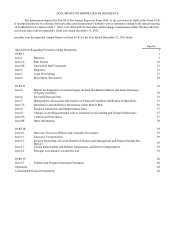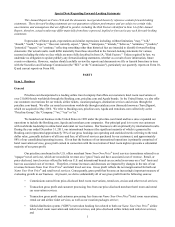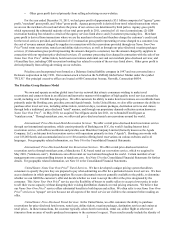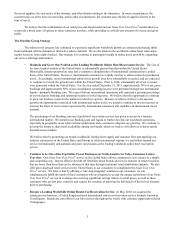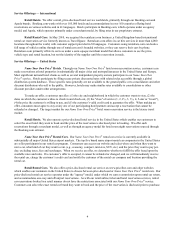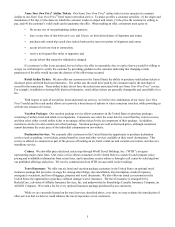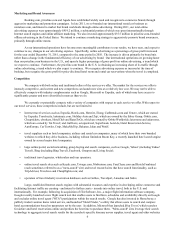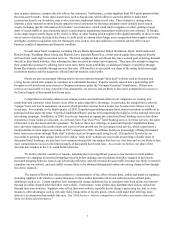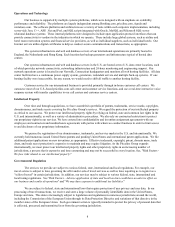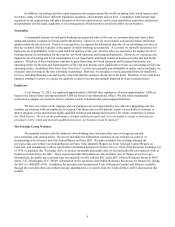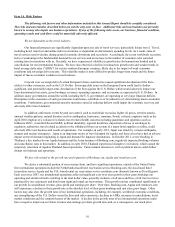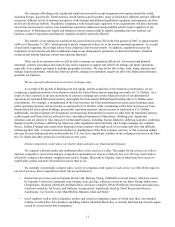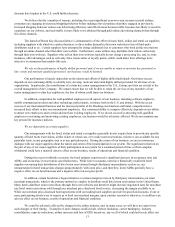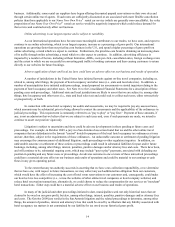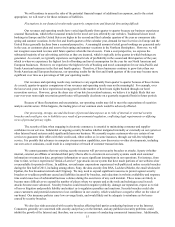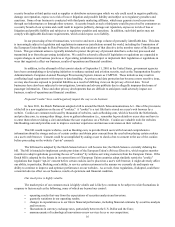Priceline 2011 Annual Report Download - page 7
Download and view the complete annual report
Please find page 7 of the 2011 Priceline annual report below. You can navigate through the pages in the report by either clicking on the pages listed below, or by using the keyword search tool below to find specific information within the annual report.6
Marketing and Brand Awareness
Booking.com, priceline.com and Agoda have established widely used and recognized e-commerce brands through
aggressive marketing and promotion campaigns. In late 2011, we re-branded our international rental car business as
rentalcars.com, and intend to market that brand worldwide through online advertising. During 2011, our total online
advertising expenses were approximately $919.2 million, a substantial portion of which was spent internationally through
Internet search engines and online affiliate marketing. We also invested approximately $35.5 million in priceline.com-branded
offline advertising in the United States. We intend to continue a marketing strategy to aggressively promote brand awareness,
primarily through online means.
As our international operations have become more meaningful contributors to our results, we have seen, and expect to
continue to see, changes in our advertising expense. Specifically, online advertising as a percentage of gross profit increased
for the year ended December 31, 2011, compared to the same period in 2010. The increase is driven primarily by brand mix
rather than a change in the fundamental efficiency of our advertising by brand. Our international operations are growing faster
than our priceline.com business in the U.S., and spend a higher percentage of gross profit on online advertising, a trend which
we expect to continue. Furthermore, the priceline.com brand in the U.S. is obtaining an increasing share of its traffic through
online advertising, a trend which we also expect to continue. We recognize advertising expense as incurred at the time of
booking, but recognize the gross profit for price-disclosed hotel room and rental car reservations when the travel is completed.
Competition
We compete with both online and traditional sellers of the services we offer. The market for the services we offer is
intensely competitive, and current and new competitors can launch new sites at a relatively low cost. We may not be able to
effectively compete with industry conglomerates such as Google, Microsoft or Expedia, each of which may have access to
significantly greater and more diversified resources than we do.
We currently or potentially compete with a variety of companies with respect to each service we offer. With respect to
our travel services, these competitors include, but are not limited to:
• Internet travel services such as Expedia, Hotels.com, Hotwire, Elong, CarRentals.com and Venere, which are owned
by Expedia; Travelocity, lastminute.com, Holiday Auto and Zuji, which are owned by the Sabre Group; Orbitz.com,
Cheaptickets, ebookers, HotelClub and RatesToGo, which are owned by Orbitz Worldwide; laterooms and asiarooms,
which are owned by Tui Travel; and Gullivers, octopustravel, Superbreak, hotel.de, Hotel Reservation Service,
AutoEurope, Car Trawler, Ctrip, MakeMyTrip, Rakuten, Jalan and Wotif;
• travel suppliers such as hotel companies, airlines and rental car companies, many of which have their own branded
websites to which they drive business, including without limitation Room Key, a recently launched hotel search engine
owned by several major hotel companies;
• large online portal, social networking, group buying and search companies, such as Google, Yahoo! (including Yahoo!
Travel), Bing (including Bing Travel), Facebook, Groupon and Living Social;
• traditional travel agencies, wholesalers and tour operators;
• online travel search sites such as Kayak.com, Trivago.com, Mobissimo.com, FareChase.com and HotelsCombined
(each sometimes referred to as a "meta-search" site) and travel research sites that have search functionality, such as
TripAdvisor, Travelzoo and Cheapflights.com; and
• operators of travel industry reservation databases such as Galileo, Travelport, Amadeus and Sabre.
Large, established Internet search engines with substantial resources and expertise in developing online commerce and
facilitating Internet traffic are creating - and intend to further create - inroads into online travel, both in the U.S. and
internationally. For example, following its acquisition of ITA Software, Inc., a major flight information software company,
Google recently launched a new flight search tool that enables users to find fares, schedules and availability directly on Google
and excludes online travel agent ("OTA") participation within the search results. Google has also invested in HomeAway, a
publicly traded vacation home rental service, and launched "Hotel Finder," a utility that allows users to search and compare
hotel accommodations based on parameters set by the user. In addition, Microsoft has launched Bing Travel, which searches
for airfare and hotel reservations online and predicts the best time to purchase them. "Meta-search" sites leverage their search
technology to aggregate travel search results for the searcher's specific itinerary across supplier, travel agent and other websites

